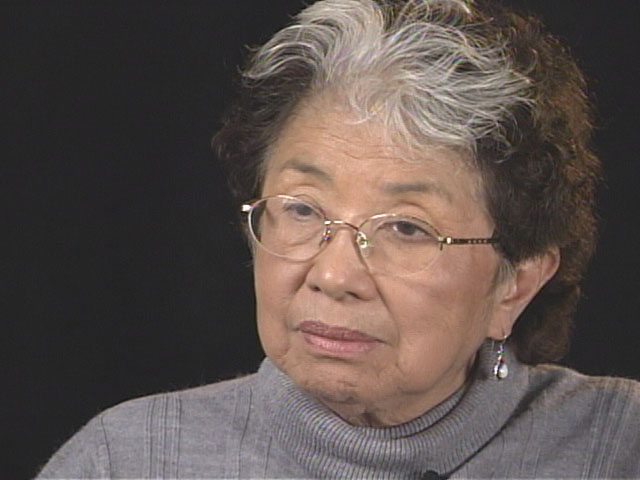Mitsuye and Nellie: Asian American Poets (film)

Mitsuye May Yamada remembers returning to the site of the former Minidoka camp to film Mitsuye and Nellie. Courtesy of Densho, excerpted from Mitsuye May Yamada Interview, Segment 39 (2002)
View in the Densho Encyclopedia
One of the earliest documentaries to broach the topic of Japanese American wartime incarceration, Mitsuye and Nellie profiles Asian American poets Mitsuye Yamada and Nellie Wong, showing them reading their poetry, meeting their family and visiting the Minidoka and Angel Island sites.
The film is divided roughly into two halves, with the first focusing on Yamada, the second on Wong, though both appear in both halves. The Yamada segment includes the two poets visiting the site of the Minidoka, Idaho, concentration camp where Yamada and her family were incarcerated during World War II. Poems by Yamada inspired by the incarceration are juxtaposed with conversation between the poets about World War II, the Yamada's camp experience, Wong's family's wartime experience as Chinese Americans, and the long term impact of the incarceration and silence of Nisei about their wartime experiences. Later, Yamada sits with her mother and two daughters, as the daughters ask their grandmother about her immigration experience and how she met her husband. Yamada reads a lengthy poem written from the perspective of an Issei picture bride , who is initially rejected by her would-be husband, but makes a life in America anyway. Yamada talks about her father's arrest on Dec. 7 (a community leader, he was among the first Issei to be arrested) and his subsequent internment, with her daughter Hedi and with Wong, as well as her subsequent efforts to shield her daughters from racism after the war. Hedi expresses appreciation for her upbringing and her growing awareness of her Japanese American heritage.
Wong talks about the uniqueness of the Asian American identity and the need for Asians for various backgrounds to stay together. The two poets read their poetry before an audience, accompanied by dancer and singer Nobuko Miyamoto and other women speaking in various Asian languages, and address an audience in a more academic setting.
Wong's segment begins with her poem, "How a Girl Got Her Chinese Name," followed by a lengthy segment at a family dinner with Wong, her five sisters, and her brother, where they talk about their family history, Angel Island, the privileging of brother William over the girls, and Nellie's journey from school secretary to published poet. Nellie's readings of a poem about her various siblings are interspersed through the segment. Next, in a scene from a play, Wong plays a mother who browbeats her 29-year-old daughters (played by Merle Woo) about getting married and having children. Wong visits her parents' grave site and reads poems about her mother and father. The film ends with Wong and Yamada visiting Ellis Island and more of their poetry.
Mitsuye and Nellie was written, produced, and directed by Allie Light and funded in part by a $120,000 grant from the National Endowment for the Humanities.
Might also like Why is Preparing Fish a Political Act? (1991); Ruth Asawa: Of Forms and Growth (1978); Yuri Kochiyama: Passion for Justice (1993)
| Release Date | 1981 |
|---|---|
| Runtime | 58 minutes |
| Director | Allie Light |
| Producer | Allie Light |
| Writer | Allie Light |
| Starring | Mitsuye Yamada, Nellie Wong, Hide Yasutake, Jeni Yamada, Hedi Yamada, Li Hong Lew, Li Keng Wong, Lai Wah Webster, Leslie Gee, Florence Wong, William Wong, Merle Woo (Merrilee in play excerpt), Nobuko Miyamoto (dancer) |
| Music | Betty Siu Junn Wong |
| Cinematography | Emiko Omori |
| Editing | Irving Saraf |
| Distributor | Women Make Movies |
| IMDB Link | http://www.imdb.com/title/tt0191285/ |
For More Information
Creef, Elena Tajima. Imaging Japanese America: The Visual Construction of Citizenship, Nation, and the Body . New York: New York University Press, 2004.
Mitsuye and Nellie on Women Make Movies website: http://www.wmm.com/filmcatalog/pages/c315.shtml .